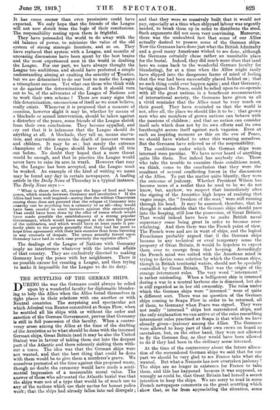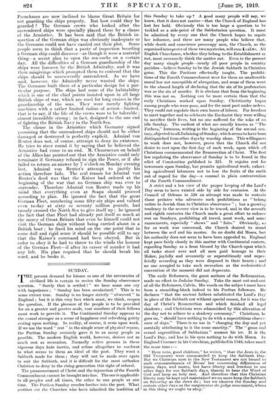THE SCUTTLING OF THE GERMAN SHIPS. D URING the war the
Germans could always be relied upon by a wonderful faculty for diplomatic blunder- ing to help the Allies when the Allies found themselves in tight places in their relations with one another -or with Neutral countries. The surprising and spectacular act which Admiral von Reuter committed at Scapa Flow, when he scuttled all his ships with or without the order and sanction of the German Government, proves that Germany is still in full possession of this faculty. When a contro- versy arose among the Allies at the time of the drafting of the Armistice as to what should be done with the interned German ships, Great Britain (and it may be also the United States) was in favour of taking them out into the deepest part of the Atlantic and there solemnly sinking them with- out a trace. The idea was that the German ships were not wanted, and that the best thing that could be done with them would be to give them a murderer's grave. We ourselves protested at the time against this proposed waste, though no 'doubt the ceremony would have made a send- mental impression of a measurable moral value. The answer of those who advocated the Atlantic burial was that the ships were not of a type that would be of much use to any of the nations which use their navies for honest police work; -that the ships had already fallen into sad disrepair ; and that they were so massivel7 built that it would not pay, especially at a time when shipyard labour was urgently needed, to break them up in order to distribute the steel. Such arguments did not seem very convincing. Moreover, there was the undoubted fact that some of our Allies actually desired to possess some of the German ships. Now the Germans have done just what the British Admiralty and a good many Americans wished to see done, although the Germans certainly chose rather an unsuitable place for the burial. Indeed, they did much more than that (and here we come back to the wonderful German faculty for blundering), for at a time when the Allies might easily have slipped into the dangerous frame of mind of feeling that the war had been successfully placed behind us; that no such thing could ever happen again ; and that Germany, having signed the Peace, could be relied upon to co-operate with all the great nations in a beneficent reconstruction of international society, the Germans have given us all a vivid reminder that the Allies must be very much on their guard. They have reminded us that the world is not, after all, the place we should like it to be ; that grown men who are members of grown nations can behave with the passions of children ; and that no nation can consider itself safe which does not by its own efforts and its own forethought _secure itself against such vagaries. Even at such an inspiring moment as this on the eve of Peace, we should have wished to utter this warning ourselves. But the Germans have relieved us of the responsibility.
The conditions under which the German ships were interned were peculiar. We have never heard of anything quite like them. Nor indeed has anybody else. Those who take the trouble to examine those conditions must, we think, conic to the conclusion that they were the resultant of several conflicting forces in the discussions of the Allies. To put the matter quite bluntly, they were the outcome of jealousy. Whether President Wilson has become MOTO of a realist than he used to be we do not know, but, anyhow, we suspect that immediately after the signing of the Armistice high hopes of realizing that vague image, the "freedom of the seas," were still running through his head. It may be assumed, therefore, that he thought it undesirable that the German ships should pass into the keeping, still less the possession, of Great Britain. That would indeed have been to make British naval supremacy cease being great in order to become over- whelming. And then there was the French point of view. The French were and are in want of ships, and the logical Frenchman probably argued that if the German ships became in any technical or even' temporary sense the property of Great Britain, it would be hopeless to expect them ever to emerge from that keeping. Accordingly the French mind was united with the American mind in trying to devise some solution by which the German ships, though in British territorial waters, should not be specially controlled by Great Britain. That was the origin of the strange internment rules. The very word " internment " is rather misleading. When a belligerent ship is interned during a war in a neutral harbour she is disarmed, but she is still regarded as in her old ownership. The rules under which the German ships were " interned " were of quite a different sort. There was no question of the German ships coming to Scapa Flow in order to be returned, all of them, to Germany when Peace was signed. They were not really " interned " ships but surrendered ships, and the only explanation we can arrive at of the rules resembling internment rules practised at Scapa is that which we have already given—jealousy among the Allies. The Germans were allowed to keep part of their own crews on board as caretakers, but, on the other hand, they were not allowed to fly the German flag, as they would have been allowed to do if they had been in the ordinary sense interned.
- At the time of the controversy about the future alloca- tion of the surrendered German ships we said that for our part we should be very glad to see France take what she wanted. But what a Nemesis has now overtaken jealousy ! The ships are no longer in existence for France to take them, and this has happened because it was supposed, as wrongly as could be, that Great Britain had herself a secret intention to keep the ships. We are sorry to read in some French newspapers comments on the great scuttling which show that, so far from appreciating the situation, some Frenchmen are now inclined to blame Great Britain for not guarding the ships properly. But how could they be guarded ? The German crews who looked after the surrendered ships were specially placed there by a clause of the Armistice. It has been said that the British in- spection of the German ships was obviously inadequate or the Germans could not have carried out their plot. Some people seem to think that a party of inspection boarding a German ship could discover—as though it were a material thing—a secret plan to open the sea-cocks on a certain day. All the difficulties of a German guardianship of the ships were foreseen by the .British Admiralty, and it was their misgivings which prompted them to contend that the ships should be unreservedly surrendered. As we have said, however, the Admiralty never wanted the ships. The Germans built them of a particular design for a par- ticular purpose. The ships had none of the habitability which is one of the chief points insisted upon in all large British ships of war, which are used for long cruises in the guardianship of the seas. They were merely fighting machines with a rather limited radius of action—limited, that is to say, if the life of the crews were to be tolerable ; almost incredibly strong ; in fact, designed to the one end of fighting the British Navy in the North Sea. The clause in the Armistice which Germany signed promising that the surrendered ships should not be either damaged or destroyed is perfectly explicit. Admiral von Reuter does not, of course, attempt to deny its existence. He tries to steer round it by saying that he believed the Armistice had come to an end. M. Clemenceau on behalf of the Allies has pointed out that the Armistice could only terminate if Germany refused to sign the Peace, or if she failed to return an answer by 7 o'clock on Monday evening last. Admiral von Renter's attempt to justify his action therefore fails. The real reason for Admiral von Reuter's deed was that the Kaiser had ordered at the beginning of the war that no German ship was ever to surrender. Therefore Admiral von Reuter made up his mind that everything even at Scapa should proceed according to plan. He ignored the fact that the great German Fleet, numbering some fifty-six ships and valued even to-day at sixty or seventy million pounds, had tamely crossed the North Sea to give itself up ; he ignored the fact that that Fleet had already put itself so much at the mercy of Great Britain that even he himself could not visit the German ships without being carried about in a British boat ; he fixed his mind on the one point that in some dull and rigid sense it should be possible still to say that the Kaiser's command had been obeyed. But in order to obey it he had to throw to the winds the honour of the German Fleet—if after its career of murder it had any left. His plan required that he should break his word, and he broke it.







































 Previous page
Previous page